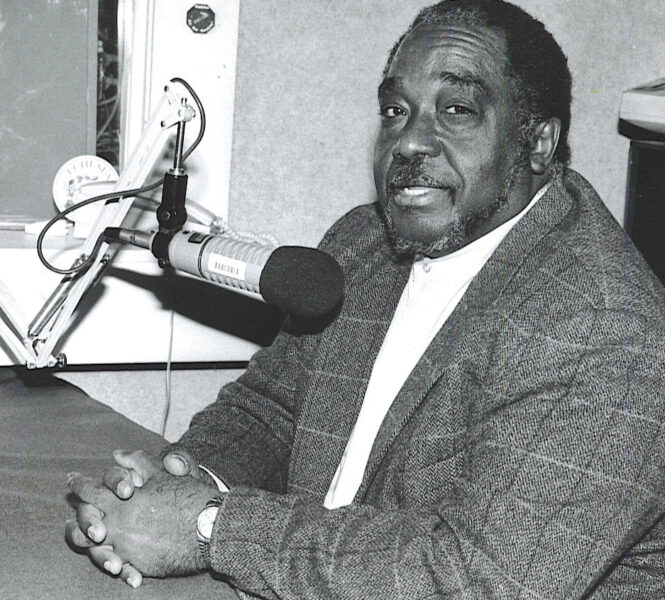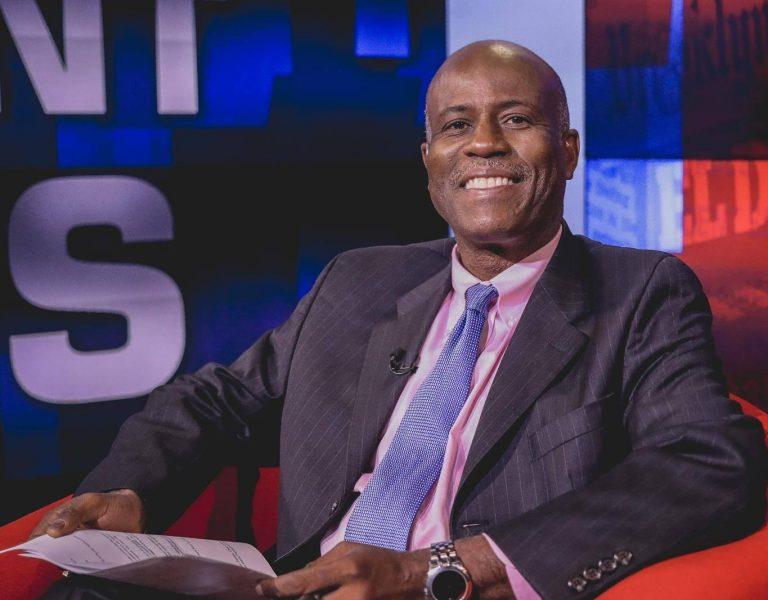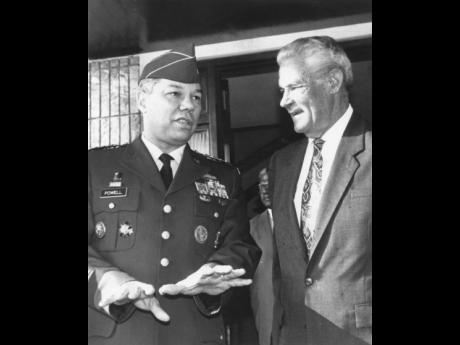I’d Like to See More Economic Development . . . We Tried to Encourage That’
Powell Couldn’t ‘Be Right on Everything’
The ‘Moderate’ Powell Won the Day
‘Treat Those Trying to Get into Our Country with Respect’
Homepage photo: Gen. Colin Powell with Jamaican Prime Minister Michael Manley in 1992 visit to Jamaica. (Credit: The Gleaner, Jamaica)
[btnsx id=”5768″]
Jamaica’s Gleaner put together this video after Colin Powell’s passing. (Credit: YouTube)
‘I’d Like to See More Economic Development . . .
We Tried to Encourage That’
“That’s the thing we really liked,” Richard Armitage, deputy secretary of state during the George H.W. Bush administration, while Colin Powell was secretary of state, said Friday at Powell’s funeral, televised from Washington’s National Cathedral.
Armitage was talking about listening to Von Martin’s “Caribbeana” radio show Saturday evenings on Washington’s WPFW-FM, part of the Pacifica Foundation’s lineup of progressive stations.
Armitage said sheepishly that the station advocated “liberation,” but nonetheless”Caribbeana” helped link Powell to his Jamaican roots.
What Armitage didn’t say is that the Saturday after Powell’s Oct. 18 passing at age 84, Martin played excerpts of his interviews with Powell in which the statesman spoke of his pride in his Caribbean roots and values, his efforts to boost the region while secretary of state and his love of Bob Marley’s music. Some of the points, such as not shaming the family, were made in Friday’s funeral remarks.
The interviews were conducted in January 1999, July 2009 and a third date being determined. Today, Haiti is a scene of tragic disarray, and democracy seems no longer on the ascendancy, with repression of the press a feature of regimes in Cuba, Nicaragua and other countries in the region.
Here is a lightly edited transcript:
“One of the values in my upbringing that I think my parents brought from the islands was a belief in education. There was also a belief in self that perhaps not everybody in America had — Black Americans had — not through any fault of their own, but through the fault of the system that this country had for a couple of hundred years.
“But my parents came to this country with a different background, a different heritage, and the children were taught that you can do anything. ‘Yes, we know it’s a segregated country. Yes, we know if you go down South, you can only go in certain places, and not other places, but that is someone else’s problem. It’s not your problem. Don’t let it weigh on you, don’t let it break your spirit.’
“And I’m pleased that in my generation the country has moved so far away from those days. But we still have a long way to go in this country to get rid of those vestiges of our racist, segregated past.”
So what would you say that could be done by both parties?
“What I’ve tried to do in my career, and now that I’m retired, is, I speak to lots of young people. Because it’s not you and me, my friend, it’s the young people who will make this country better and world better.
“And what I say to the young audiences I speak to, whether it’s here in Washington, or in Harlem, or anywhere in the country, is — and I speak to lots of young people — is that they have to get all the education they can. They have to believe in themselves. They have to do the right things in life. And they have to stay away from the things that they know will hurt them. You got to stay away from drugs, you got to stay away from . . . crime. And the only thing people will measure you against is the standard of excellence. And the only thing they will care about when you grow up and try to get that job is whether you can do the job.
Richard Armitage, Powell’s deputy secretary of state during the George H.W. Bush administration, was an early speaker at Friday’s funeral service. The “PBS NewsHour” posted this video, and host Judy Woodruff noted on the air that about 40 schools are named after Powell.
“There’s an expression we used in the Army. When you first come in the Army, the sergeants scream at you. And they tell you there are only three answers you can give to any question I ask, and that’s ‘yes, sir,’ ‘no, sir’ and ‘no excuse, sir.’
“So when I ask you why were you late this morning, the answer is ‘no excuse, sir.’ Don’t give me reasons about the car broke down, or this happened, or your alarm clock didn’t go off, there’s no excuse for you being late. And it’s that sense of self-responsibility, and you’ve got to get the job done. . . . therefore, get your education, stay away from the wrong things. Have a sense of shame, be proud of yourself, and don’t shame yourself or shame the family. And above all, believe in this country, don’t run it down. It’s still the best place on earth.”
Your experience as secretary of state. What are some of the good times, some of the bad times?
“Well, we did a lot. We doubled assistance to the developing world. We quadrupled the assistance that we provide to Africa. I tried to work with the Caribbean, the biggest challenge I had in the Caribbean was, of course, with Haiti. And much of my career has been bound up with issues in Haiti.
“I helped President [Jean-Bertrand] Aristide get back in power, back in 1994, when I went with President Carter and Senator [Sam] Nunn to Haiti, and then of course, I had to assist President Aristide in leaving office a couple of years ago when things were on the verge of revolt and so now, I’m encouraged that the Haitians have pulled themselves together and now have an elected government that represents the people, and now they’ve got to get on to the business of economic development, unemployment, education. And I hope that all the Caribbean nations, all of CARICOM, [the Caribbean Community organization] will now recognize what the Haitian people have done, and that all the CARICOM community will come together to help Haiti.
“It was the problem of Haiti that was perhaps the most demanding for me. Both as chairman and in my private life when I went down there again as secretary of state. I’d like to see more economic development in the Caribbean and we tried to encourage that.
“I’m pleased that in Latin America and in the Caribbean, we’ve seen such a move toward democracy and for the last 18 years, when I compare it to the situation that existed when I was Ronald Reagan’s national security adviser, we had the Sandinistas in power [in Nicaragua], we had Castro’s Cuba fomenting difficulties throughout the region, we had generals running countries, juntas running countries; now all of those countries are democracies. Not all of them behave the way I would like to see them behave, but the issue is they’re democracies! And if they don’t perform for their people, then their people can vote them out again. And the thing the region needs more than anything else, that we tried to foster, is economic development.

Well, I know you’re very busy, let’s talk a little bit about music. What kinds of music do you like?
“I enjoy all kinds of music, but for greatest relaxation, I go back to my Caribbeana roots. And I was flying in a private plane, coming back from the West Coast yesterday, and had my little CD, and I had one of my favorite Sparrow albums, and I had several pans, and I spent four hours in the airplane listening to Sparrow and pan,” a reference to steel drum music associated with Trinidad and Tobago. “It was great relaxation and enjoyment. I’ve been listening! And not only did I enjoy the music, but it brings back old memories of family and parties and doing the . . . and all like that, and calypso.
“The steel pan — made from the end of an oil drum — is probably the most important new acoustical (that is, nonelectronic) musical instrument developed in the 20th century,” according to Physics Today.
“I’m not much into modern variations; I enjoy Bob Marley, but he’s really the only reggae artist I concentrate on, because I thought he was such a remarkable artist and powerful artist, and his children I listen to. But I’m afraid hip-hop hasn’t got me yet, man.
“My grandchildren know it. My two grandsons know all the songs. My daughters know it well. But there are some things that young people want to have that old people in their life are not supposed to have, and hip-hop is one of them.”
Is there a piece of advice you’d like to give to parents or children, be they in the Caribbean or in the United States?
“. . . To all my friends, your friends who are listening, I would just say to them, continue to be proud of our heritage, continue to learn from the experience of our diaspora, and above all, make sure we’re raising a new generation of youngsters who understand the sacrifices we all went through. And the struggles we had to fight and all we overcame.
“And we did it all just for them. And if they waste it, then they’re not only wasting their lives but they’re wasting the lives of those of us who went before. And so invest in those children. Give them your time, give them your attention, form strong marriages and encourage your children to do so. And the day will come when we are all one people united, Black, white, green, yellow, just as Dr. [Martin Luther] King [Jr.] wanted us to be.”
Powell Couldn’t ‘Be Right on Everything’
 Journal-isms asked Garry Pierre-Pierre (pictured), founder of the New York-based Haitian Times, for his reaction to Colin Powell’s remarks, and here is his edited reply:
Journal-isms asked Garry Pierre-Pierre (pictured), founder of the New York-based Haitian Times, for his reaction to Colin Powell’s remarks, and here is his edited reply:
“I have some issues about his take on [Jean-Bertrand] Aristide. His insistence that countries be inside that democratic box, otherwise it’s a problem, is the crux of the U.S. administration policy and it’s bipartisan.
“In the case of Haiti, the country went literally overnight from a 29-year dictatorship to a ‘democracy.’ Before the dictatorship, things weren’t so well governed. You provide a short ramp to that democracy and you wonder why the country remains mired in instability. If the U.S really cared about real democracy in Haiti, it would have helped build it up and not force the country into a system that it doesn’t understand and is not prepared to implement.
“The pillars of democracy, a strong political party system, civil society and the media, were nonexistent prior to 1986 when [Jean-Claude ‘Baby Doc’] Duvalier was exiled. I also found some of description about the time and energy spent on Haiti to be a bit neocolonialistic.
“Having said that, I have much respect and admiration for Gen. Powell. He has been a trailblazer for us in ways that he may not have understood or realized. People can’t be right on everything. In the case of Haiti, the U.S was not as benign as he described it.”
The ‘Moderate’ Powell Won the Day
In a harsh critique from the Black left, Margaret Kimberley (pictured) of Black Agenda Report also raised the Aristide question.
 Kimberley wrote Oct. 20, “The U.S. wanted president Jean-Bertrand Aristide out, kidnapped him at gunpoint, and took him to the Central African Republic in March of 2004. Members of the Congressional Black Caucus (CBC) such as Maxine Waters and Charles Rangel must be credited with speaking up. When Powell claimed that Aristide wanted to be taken out of his country because he feared for his life, Rangel called him a liar saying, ‘… this information about Aristide asking to leave the country or that his life was in danger was never shared with us.’ These CBC members and everyone else who protested were marginalized and the ‘moderate’ Powell won the day without a peep from the rest of [Congress] or the corporate media.”
Kimberley wrote Oct. 20, “The U.S. wanted president Jean-Bertrand Aristide out, kidnapped him at gunpoint, and took him to the Central African Republic in March of 2004. Members of the Congressional Black Caucus (CBC) such as Maxine Waters and Charles Rangel must be credited with speaking up. When Powell claimed that Aristide wanted to be taken out of his country because he feared for his life, Rangel called him a liar saying, ‘… this information about Aristide asking to leave the country or that his life was in danger was never shared with us.’ These CBC members and everyone else who protested were marginalized and the ‘moderate’ Powell won the day without a peep from the rest of [Congress] or the corporate media.”
‘Treat Those Trying to Get into Our Country with Respect’
In an interview touching on his status as a son of immigrants, Colin Powell told Jorge Ramos of Univision that “we should do something about those who are in our country and are undocumented, as we say, and we should find a way to bring them out of the darkness into the light, and we should treat them with respect.”
On the “Al Punto” program of May 27, 2012, (video) Ramos asked, “You’re, of course, the son of immigrants from Jamaica, and we have been noticing here in the United States an increasing anti-immigrant feeling, mostly coming from Republicans approving new laws in Arizona, Alabama, Georgia. I know you support the Dream Act. Do you have any recommendations to the Republican Party in order to try to win the Hispanic vote?”
Powell replied, “It’s not so much the Hispanic vote. The Hispanic vote will follow, you know, whatever policies are adopted. What I say to my Republican friends — and to my Democratic friends is that this country was created by immigrants.
“We are an immigrant nation, and as you have seen in the press recently, in our birthrates, we are becoming more and more minority.
“The majority of youngsters being born now are what one would call minority. So, in one generation, these kids are going to grow up, and the minority is going to be the majority, and most of them have an immigrant background.
“We are blessed by immigration, and therefore, we ought to have sensible immigration policies, and I’ve advocated this throughout my public career, immigration policies that regularize people coming to our country to seek a better life, and we should do something about those who are in our country and are undocumented, as we say, and we should find a way to bring them out of the darkness into the light, and we should treat them with respect, and we should treat those trying to get into our country with respect, and try to make it easier to get into our country on a legal basis. And so, I am a great supporter of programs such as the Dream Act.
“I’m sorry it did not pass when it first came around, and President Bush and I worked very, very hard in 2001 to try to get an immigration policy moving forward, and we worked with [Mexican president] Vicente Fox and [foreign minister] Jorge Castañeda to do that, but it all ran into difficulty with 9/11, and there was a great move to protect ourselves, protect our borders, and that’s fine, but we will lose who we are as a nation if we shut ourselves off to immigrants, if we shut ourselves off to other people throughout the world who still see America as the place of opportunity. . . .”
- Brunno Braga, TravelNoire,com: Steel Pan Music: Trinidad and Tobago’s Musical Gift To The World (July 27)
- Daniella Diaz and Priscilla Alvarez, CNN: Democrats place all bets on third attempt to include immigration in economic bill
- Lester Hinds, Jamaica Gleaner: Jamaicans in US describe Colin Powell as icon (Oct. 18)
- The HistoryMakers: Gen. Colin L. Powell
- Loop News, Jamaica: 10 facts about Colin Powell, son of Jamaican immigrants (Oct. 18)
- Camilo Montoya-Galvez, Elissa Steglich and Andrea Leiner, “1A,” NPR: When It Comes to Immigration Where Does the Biden Administration Stand?
- Sputnik News: Powell Embraced His Caribbean Roots Throughout Career, Kept Rum in Cabinet, Jamaican Envoy Says (Oct. 19)
[btnsx id=”5768″]
To subscribe at no cost, please send an email to journal-isms+subscribe@groups.io and say who you are.
Facebook users: “Like” “Richard Prince’s Journal-isms” on Facebook.
Follow Richard Prince on Twitter @princeeditor
Richard Prince’s Journal-isms originates from Washington. It began in print before most of us knew what the internet was, and it would like to be referred to as a “column.” Any views expressed in the column are those of the person or organization quoted and not those of any other entity. Send tips, comments and concerns to Richard Prince at journal-isms+owner@
View previous columns (after Feb. 13, 2016).
View previous columns (before Feb. 13, 2016)
-
- Diversity’s Greatest Hits, 2018 (Jan. 4, 2019)
- Book Notes: Is Taking a Knee Really All That? (Dec. 20, 2018)
- Book Notes: Challenging ’45’ and Proudly Telling the Story (Dec. 18, 2018)
- Book Notes: Get Down With the Legends! (Dec. 11, 2018)
- Journalist Richard Prince w/Joe Madison (Sirius XM, April 18, 2018) (podcast)
- Richard Prince (journalist) (Wikipedia entry)
- February 2018 Podcast: Richard “Dick” Prince on the need for newsroom diversity (Gabriel Greschler, Student Press Law Center, Feb. 26, 2018)
- Diversity’s Greatest Hits, 2017 — Where Will They Take Us in the Year Ahead?
- Book Notes: Best Sellers, Uncovered Treasures, Overlooked History (Dec. 19, 2017)
- An advocate for diversity in the media is still pressing for representation, (Courtland Milloy, Washington Post, Nov. 28, 2017)
- Morgan Global Journalism Review: Journal-isms Journeys On (Aug. 31, 2017)
- Diversity’s Greatest Hits, 2016
- Book Notes: 16 Writers Dish About ‘Chelle,’ the First Lady
- Book Notes: From Coretta to Barack, and in Search of the Godfather
- Journal-isms’ Richard Prince Wants Your Ideas (FishbowlDC, Feb. 26, 2016)
- “JOURNAL-ISMS” IS LATEST TO BEAR BRUNT OF INDUSTRY’S ECONOMIC WOES (Feb. 19, 2016)
- Richard Prince with Charlayne Hunter-Gault,“PBS NewsHour,” “What stagnant diversity means for America’s newsrooms” (Dec. 15, 2015)
- Book Notes: Journalists Follow Their Passions
- Book Notes: Journalists Who Rocked Their World
- Book Notes: Hands Up! Read This!
- Book Notes: New Cosby Bio Looks Like a Best-Seller
- Journo-diversity advocate turns attention to Ezra Klein project (Erik Wemple, Washington Post, March 5, 2014)
When you shop @AmazonSmile, Amazon will make a donation to Journal-Isms Inc. https://t.co/OFkE3Gu0eK
— Richard Prince (@princeeditor) March 16, 2018
![]()


2 comments